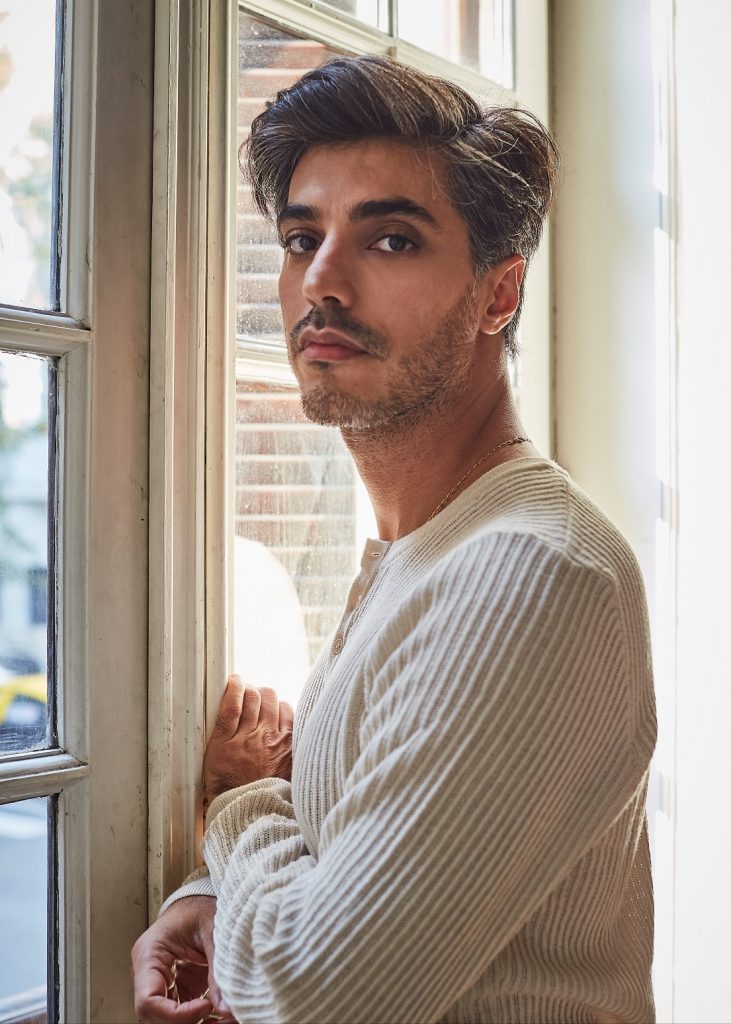Nicolás Manservigi is a storyteller. Hailing from Argentina he has written novels, a film script, and then there is the way he uses his voice. It’s not only the distinctive baritone color and vocal agility, but the way Nicolás paints pictures with his emotional command of the material that touches hearts.

Natasha Barbieri: Nicolas, you began performing at a very early age. What are some memories you have from this time?
Nicolás Manservigi: That’s right, at six years old in the stable children’s choir of Tucumán, north of Argentina. The memories are of pure joy but above all of a time where I took refuge in those rehearsals and performances of everything that happened in my life. As a child, it was always hard for me to “fit in” and I had serious bonding and acceptance problems from others, but curiously the only time where I felt loved and respected was when I was performing, so since I was little, I gave my whole being to music.
Natasha Barbieri: Where did you train your voice?
Nicolás Manservigi: Well, as I said before, I started in the children’s choir, and then I always continued with private teachers (Ana Ternavasio, Laura Varela) who were opera singers. When I was older, living in Buenos Aires, I trained in courses at the Instituto Superior de Arte del Teatro Colón where I met my teacher Lucía Boero who has been taking care of my voice for years.
Natasha Barbieri: Who were some of your early influences?
Nicolás Manservigi: The first people that I heard sing, or at least that is what I remember, are my parents. They naturally sang at home and there was always all kinds of music. In fact, it was Mom who took me to the choir audition when I was just six years old. Then, I must say that the first voices that captivated me were those that I heard in the theater, of local singers; and at home when the records of Mercedes Sosa, María Callas, and Andrea Bocelli were playing.
Natasha Barbieri: You have released some beautiful songs and videos. Can you tell us how you select your repertoire?
Nicolás Manservigi: Thanks! Regarding the selection of songs that I choose to sing, it generally has to do with the fact that there is something of that sonic universe that summons me, either from the melody or the lyrics, or even the author. I tend to be demanding when choosing since I am not attracted to many things because I feel that much of today’s music has lost depth, melody, and lyricism; hence also that my musical tastes lean towards compositions from other times.
Natasha Barbieri: Tell us about your first album. When was this recorded and what are some of your favorite memories from it?
Nicolás Manservigi: Actually, my first album was almost an accident, since I had not planned to record it, but it happened that after the concerts many people asked me where they could buy an album of mine, and I didn’t have one! So, I decided to record one, and thus the only studio album I have so far was born. Then I have released singles, but since I am old school, I always prefer the concept of a complete album. The memories I have are brief because it is an album that was recorded very quickly, only with piano and the repertoire was largely a consequence of the songs that I used to sing live at that time. If I look at him from a distance, I have affection for him but today I would change a lot of things.
Natasha Barbieri: Do you have any artists you would like to collaborate with in the future?
Nicolás Manservigi: Oh yeah! If you allow me to dream, I would love to collaborate with Katherine Jenkins, Andrea Bocelli, Christina Aguilera, and even Ute Lemper, also Buika, Delcy… many! And from Argentina with Laura Esquivel or Natalia Oreiro. This disparate choice may only have to do with simple admiration for those personalities, voices, careers, or because they accompanied me at different times in my life.
Natasha Barbieri: Tell us a little bit about your work as an actor on the opera stage.
Nicolás Manservigi: I never imagined that I would go to work at the Teatro Colón as an actor. In fact, I had the opportunity to study there and I did not want to, precisely because I felt that my musical search was going in another way, and accepting that was, at first painful because with it my opportunity to step on that stage vanished, but inside I said to myself: “Someday, whatever, you will be on that stage” and that’s how it was. In 2015 I was selected to participate in Don Carlo’s staging, Directed by Eugenio Zanetti (Oscar winner) and since then I have worked in many stage productions with musicians from all over the world from whom I have learned a lot, in addition to having been able to see up close the rehearsals of wonderful singers that otherwise would have been inaccessible to me. The last thing we were going to do is “Nabucco” but days after the premiere, the pandemic was declared in 2020. That work was corporal, coordination, and a lot of physical wear for the body of actors. I hope someone will recover because it was a job interesting of the teacher Stefano Poda.
Natasha Barbieri: When you prepare a song, do you think of the music or lyrics first?
Nicolás Manservigi: It depends on the part. There are songs where that has the right balance, and there are others where one or the other stands out. In my case, for example, to prepare a song I start by seeing what the text says, who composed it, in what context; and then I get on the music. Perhaps this has to do with the fact that I am a writer too, so the word for me has an important weight, otherwise, we would make instrumental music. It happens to me that I observe many good singers who say nothing to me because the phrasing is not sustained in the sense of the word and its meaning. We cannot, as performers, rely only on the melody, but on the entire universe of the song, therefore I must say that both things are worth taking into account when starting to study a topic.
Natasha Barbieri: You have written the novels “Internal Landscapes” and “The Carrier.” Tell us about your inspiration for these stories?
Nicolás Manservigi: Writing, as well as music, appeared in my life at a very young age. I was an observant and quiet child, two necessary conditions for anyone who wants to dedicate themselves to writing, and if we talk about observation, I think that all the themes that I later write in the stories arise from there. Particularly in my two published books, the plots are derived from real events, although taken to fiction. The first, “The Carrier”, I wrote when I was 18, and the second, “Inner Landscapes” when I was 24. Last year I finished my third book, still unpublished.
Natasha Barbieri: You also wrote a film script for “The Well.” How did this opportunity come about?
Nicolás Manservigi: The director knew my books, and he asked me to write a script based on a story of mine and that’s how “Aporia” came about, which later led to collaborating with him on the script for the film “El Pozo” that talks about autism and how it affects the family framework. That movie was a surprise of a lifetime, I learned a lot and I could understand that if I put my mind to it, I could also write my own scripts. Sometimes it’s just trusting yourself, maybe that’s what works are for.
Natasha Barbieri: In addition to your work as a solo artist, you are also a member of Noialtri. Can you tell us a little bit about this?
Nicolás Manservigi: In 2016 I saw an audition where they asked singers to handle pop and opera repertoire, in addition to being tenors. I, despite being a baritone, wanted to introduce myself the same way. And I went, but then I didn’t have any news. A year passed and at the beginning of 2017, the producer called me to tell me that the artistic team had changed and they wanted to listen to me again; so, I went to the audition again, and soon after they told me that I had been selected. At first, I didn’t understand what the project was about until finally we were informed that it would be a lyrical/pop trio similar to Il Volo, but in Argentina, with the idea of touring the country leading a show that combined both repertoires. Well, that’s where it all started. We’ve sung in many theaters and cities, and after having changed singers (I’m the only one left from the original line-up) we continue to race to prepare new things. It is a project that excites me because it is far from what I do, that although we are both inside the Classical Crossover, in Noialtri a “effected” or “big” sound is clearly seen while in my concerts I look for intimacy and sensitivity in sound.
Natasha Barbieri: What are some of the things you’d like to accomplish in the future?
Nicolás Manservigi: Without a doubt, having the possibility of singing abroad makes me very curious to be able to sing in Mexico, Spain, Italy, Russia, to name just a few places. But, beyond that, I wish to continue making music, enjoying having the best job in the world.
Natasha Barbieri: What new music can we expect from you?
Nicolás Manservigi: Lots of new music! I am currently finishing recording my second and new studio album, with a repertoire exclusively in Italian, from the decades between the 60s and 80s. It is a project that I am very excited about since the arrangements were also written exclusively for me, by Alejandro Cattaneo, with guest musicians, strings, harps, mandolins, choirs, and much more. It will be an album where each song contains its own sound universe, where also, as a singer, I had to run from my comfort to approach the works from a more acute, melodic, and higher register. I will also have the special participation of the Colombian singer Delcy, whom I admire very much, and an audiovisual proposal with her own videos. I can’t wait to share it.







